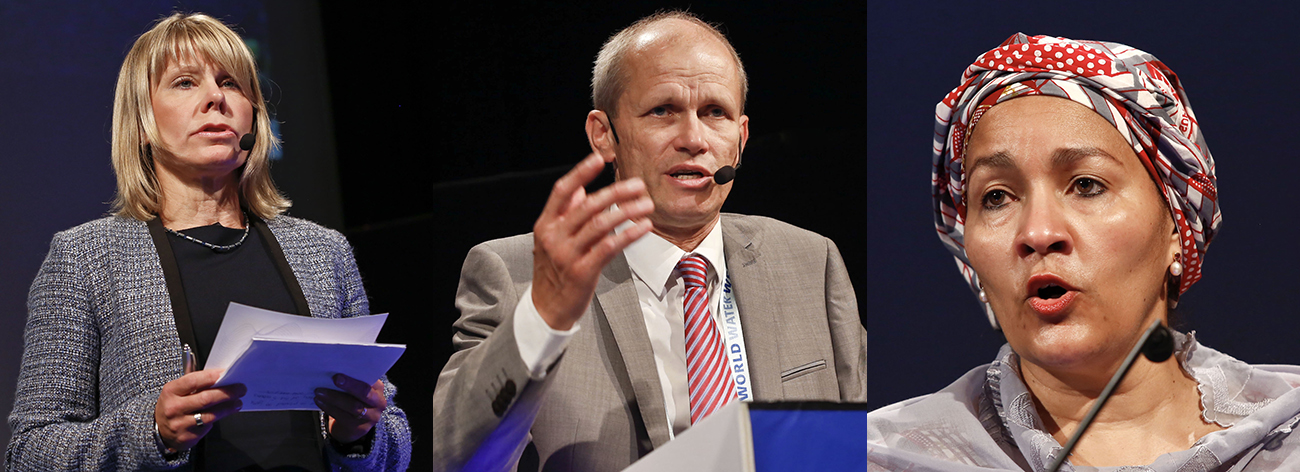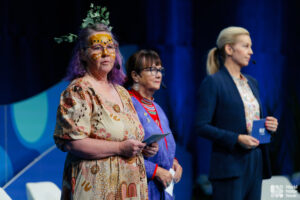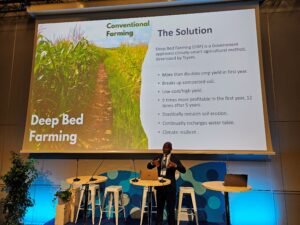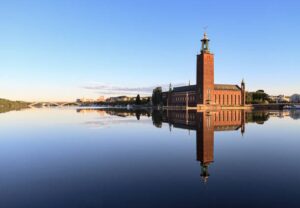World Water Week: Water efficiency must be the guiding star in fight to eradicate hunger and poverty
Stockholm (2014-09-05) – The 2014 World Water Week, focusing on energy and water, closed today with participants jointly emphasising the...
Stockholm (2014-09-05) – The 2014 World Water Week, focusing on energy and water, closed today with participants jointly emphasising the importance of a water goal, as well as intimate integration of energy and water in the Post-2015 Development Agenda. The Week also concluded that water efficiency is one of the main tools in combatting poverty and hunger.
A few obstacles overshadow all others in the fight to end poverty. One is the silo mentality. Sectors must break barriers between them and use synergies to their full potential. This message was underlined by Stockholm Statement on Water, released throughout the Week as a series of films and papers. Another is the gross inefficiencies in water use.
“To counter the challenge of booming water demand we must manage it in a far smarter way. It concerns our lives and our livelihoods. In five years I want us all in our daily lives to be as aware of water efficiency as we are of energy efficiency today,” Mr. Torgny Holmgren, Executive Director of Stockholm International Water Institute, told the closing session.
World Water Week started with a call from some of the world’s leading water, environment and resilience scientists and experts, who said that better management of rain, is the only way hunger and poverty can be eradicated. Without improved rainwater management, the future development goals currently being discussed are unrealistic, said the scientists, who include Professor Malin Falkenmark of Stockholm International Water Institute/Stockholm Resilience Centre andProfessorJohan Rockström of Stockholm Resilience Centre.
During the Week, which broke all earlier attendance records with over 3,000 participants from more than 140 countries, water efficiency and ways to achieve it was highlighted in several sessions and discussions. Mr. Neil Macleod of eThekwini Water and Sanitation in South Africa, spoke of the necessity to invent a toilet that does not need water. “The flushing toilet belongs in the history books, in the museums,” said Mr. Macleod, stating that a non-flush toilet would cut a household’s water use by 30 per cent and allow us to extract both fuel and fertiliser that today literally is flushed down the drain.
The head of the International Energy Agency (IEA), Ms. Maria van der Hoeven, spoke of the need to grow biofuels in areas that rely on rain rather than irrigation, something that would also lessen dependency on power to draw water.
“We must go from ideas to action, from goals to implementation. If we assume there will be a Sustainable Development Goal on water, we must now look at how it can be integrated with other goals and at concrete measures for implementation,” said Mr. Torgny Holmgren.
To feed into the soon-to-start UN member state negotiations on the Post-2015 Development Agenda, SIWI released the Stockholm Statement on Water, made up of five thematic arguments why water must not be forgotten when debating and negotiating the Sustainable Development Goals for future resilient societies; water for health, water for sustainable growth, water for agriculture, water for energy and water for climate.
“Nothing is set until the final decision in 2015. We need to keep up the pressure,” said Ms. Karin Lexén, SIWI Director of World Water Week, Prizes and International Processes.
The need for holistically approaching energy and water issues was reiterated by the IEA’s Ms. van der Hoeven, who said that “The water-energy nexus if firmly on the agenda of IEA. And so is development. We know that 1.2 billion people in the world lack electricity, mainly in sub-Saharan Africa. We therefore applaud next year’s World Water Week theme, water and development.”
Ms. Amina Mohammed, the UN Secretary-General’s Special Advisor on Post-2015 Development Planning, concluded that “Next year is a momentous year, it is a year of transformation. We are moving from a poverty agenda to a sustainable development agenda. That is no mean feat. We need leadership that is courageous, and I hope we can use the energy from this Week as a baton for the work we have ahead of us.”
Prizes
During the Week, several prizes were awarded for excellence in water-related issues. The Stockholm Industry Water Award was awarded to eThekwini Water and Sanitation, serving the Durban metropolitan area, for its transformative and inclusive approach to providing water and sanitation. Hayley Todesco from Canada received the 2014 Stockholm Junior Water Prize today for inventing a method that uses sand filters to treat contaminated water and recover water for reuse.And finally, the prestigious Stockholm Water Prize was awarded to Professor John Briscoe of South Africa, for his unparalleled contributions to global and local water management, inspired by an unwavering commitment to improving the lives of people on the ground.
About Stockholm International Water Institute
Stockholm International Water Institute (SIWI) is a policy institute that generates knowledge and informs decision-makers towards water wise policy and sustainable development. SIWI performs research, builds institutional capacity and provides advisory services in five thematic areas: water governance, transboundary water management, water and climate change, the water-energy-food nexus, and water economics. SIWI organises World Water Week in Stockholm – the leading annual meeting place for water and development issues – and hosts the Stockholm Water Prize, the Stockholm Junior Water Prize and the Stockholm Industry Water Award.
Note to Editors:
- Information about the World Water Week and the Stockholm International Water Institute; www.worldwaterweek.org and siwi.org
- Press kit, events, press releases and interview requests: www.worldwaterweek.org/pressroom
- Information about the 2014 Stockholm Statement on Water: siwi.org/stockholmstatement2014
- Photos and video: https://siwi.org/mediahub
- Twitter: Follow @siwi_mediafor press updates #wwweek and @www_team for participant debates
- Essential background reading: SIWI’s report “Energy and Water: The Vital Link for a Sustainable Future”,feeding into the discussions at World Water Week.








